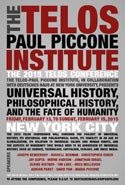 Anyone familiar with Étienne Gilson’s teachings knows he is celebrated for: being a Thomist, his criticism of “essentialism” in philosophy, emphasizing St. Thomas’s revolutionary focus upon the principle of the act of existence (esse) within the natures of things, and a shift away from ideas to existential judgments within Western philosophical thought. Odd, then, are two claims related to Gilson made by people who knew him well. The first, from Gilson’s biographer Lawrence K. Shook, says of Gilson, “An Erasmian humanist at heart, he wanted to end all wars and to liberate men to work out their salvation in the context of personal freedom. He believed that this could be achieved through the kind of education that fostered the acquisitions of moral virtues through the writings of Cicero and Seneca.”
Anyone familiar with Étienne Gilson’s teachings knows he is celebrated for: being a Thomist, his criticism of “essentialism” in philosophy, emphasizing St. Thomas’s revolutionary focus upon the principle of the act of existence (esse) within the natures of things, and a shift away from ideas to existential judgments within Western philosophical thought. Odd, then, are two claims related to Gilson made by people who knew him well. The first, from Gilson’s biographer Lawrence K. Shook, says of Gilson, “An Erasmian humanist at heart, he wanted to end all wars and to liberate men to work out their salvation in the context of personal freedom. He believed that this could be achieved through the kind of education that fostered the acquisitions of moral virtues through the writings of Cicero and Seneca.”
|
At the 2014 Telos in Europe Conference in L’Aquila, Italy, sociologist Dan Krier talked about his experiences at the conference as well as what distinguished the Telos conference from more discipline-specific academic gatherings. For anyone interested in participating in the upcoming 2015 Telos Conference in New York, abstracts will be accepted through October 20. For complete details and the full call for papers, please visit the Telos-Paul Piccone Institute website. We hope to see you there! On February 14–15, 2015, the Telos-Paul Piccone Institute will hold its annual conference in New York City. The theme of the conference will be “Universal History, Philosophical History, and the Fate of Humanity.” The deadline for abstract submissions has been extended until October 20, so if you missed last week’s deadline but still wish to present a paper, send your abstract (no more than 250 words) and a short c.v. to telosnyc@telosinstitute.net and place “The 2015 Telos Conference” in the email’s subject line. For the full call for papers and other details about the conference, please visit the conference page at the Telos-Paul Piccone Institute website. Just a reminder that the deadline for abstract submissions for this year’s Telos in Europe conference has been extended until June 15. If you plan to submit your paper for the conference, please be sure to email your abstract (no more than 250 words) to laquila@telosinstitute.net by that date, and place “L’Aquila 2014 conference” in the email’s subject line. For complete details about the conference, as well as the full call for papers, visit the conference page on the Telos-Paul Piccone Institute website. At this year’s Telos Conference in New York City, Telos Associate Editor Adrian Pabst outlined the theme of the upcoming Telos in Europe Conference, which will be held on September 5–8, in L’Aquila, Italy. This conference will focus on “The Idea of Europe,” and will offer speakers and attendees an opportunity to discuss Europe’s current crisis of identity. For complete details about the conference, as well as the full call for papers, please visit the conference page on the Telos Paul Piccone Institute website, located here. |
||||
|
Telos Press Publishing · PO Box 811 · Candor, NY 13743 · Phone: 212-228-6479 Privacy Policy · Data Protection Copyright © 2025 Telos Press Publishing · All Rights Reserved |
||||


